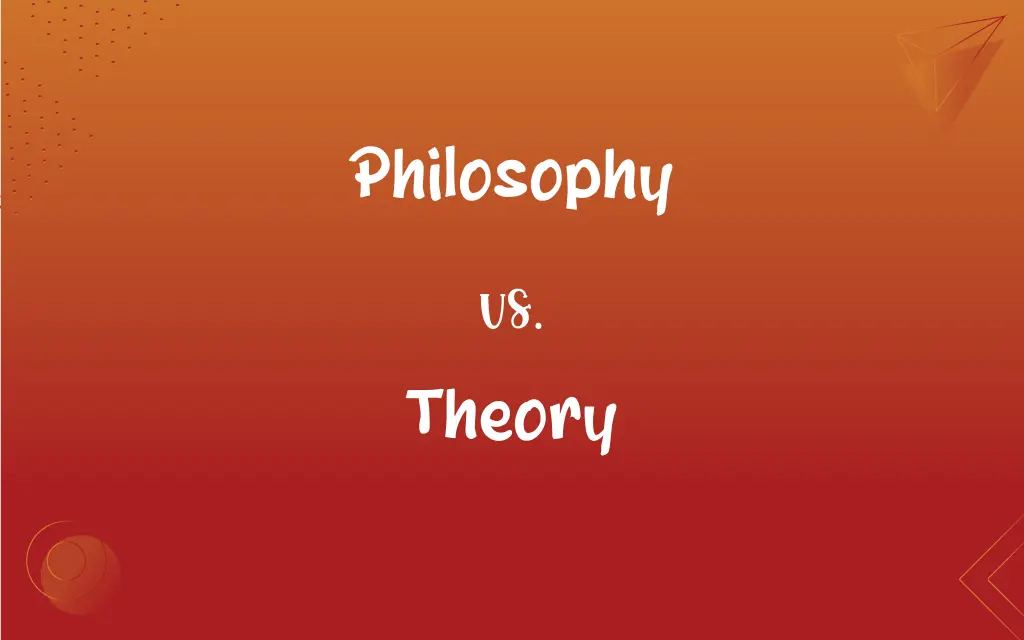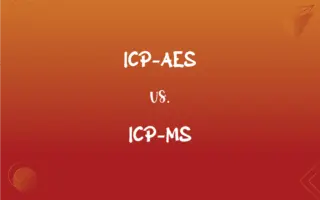Philosophy vs. Theory: What's the Difference?
Edited by Aimie Carlson || By Janet White || Published on March 5, 2024
Philosophy explores fundamental questions about existence, reality, and knowledge; theory is a system of ideas intended to explain something, based on principles independent of the subject matter.

Key Differences
Philosophy and theory serve different purposes in the realm of knowledge and understanding. Philosophy delves into the critical examination of the nature of existence, reality, and knowledge, posing questions about life, ethics, and the universe. It seeks to understand the fundamental truths about our world and our place within it. Theory, on the other hand, is a structured set of concepts that explains phenomena through generalized principles. Theories are often based on empirical evidence and are used to predict and understand aspects of the physical and social world
Philosophy asks "why" and "what" questions about the world and our experience of it, engaging with concepts such as morality, beauty, and truth. It is more concerned with offering perspectives and frameworks for understanding the complexities of existence. Theory, conversely, seeks to provide concrete explanations and models that can be tested and applied, often within scientific or social scientific contexts.
The relationship between philosophy and theory is complementary. Philosophy lays the groundwork for theoretical development by questioning and refining the fundamental concepts that theories attempt to explain. In turn, theories can inform and challenge philosophical perspectives, leading to deeper insights and understandings.
Philosophy emphasizes critical thinking, debate, and the exploration of ideas without necessarily seeking definitive answers. Theories, by their nature, aim to offer explanations and predictions that can be empirically tested and validated. While philosophy broadens our perspective on the fundamental nature of reality, theory provides the tools for systematically understanding and explaining specific aspects of that reality.
Comparison Chart
Definition
A discipline that explores fundamental questions of existence and knowledge.
A system of ideas explaining phenomena, often based on empirical evidence.
ADVERTISEMENT
Purpose
To question and understand the nature of reality, ethics, and knowledge.
To provide explanations and predict outcomes within specific domains.
Approach
Abstract, questioning, and broad.
Empirical, explanatory, and focused.
Application
Ethical, existential, and logical reasoning.
Scientific, social, and practical phenomena.
Outcome
Insights, perspectives, and frameworks for understanding.
Models, predictions, and explanations that can be tested.
Philosophy and Theory Definitions
Philosophy
The study of the fundamental nature of knowledge, reality, and existence.
Philosophy challenges us to question the essence of being.
ADVERTISEMENT
Theory
An idea used to account for a situation or justify a course of action.
His theory was that early exposure to music enhances learning.
Philosophy
The theoretical basis of a branch of knowledge or experience.
The company's philosophy focuses on customer satisfaction.
Theory
A hypothesis or set of principles analyzed and proposed to explain a phenomenon.
The theory proposed a new way of understanding quantum mechanics.
Philosophy
A personal outlook or values governing one's behavior.
Living a simple life is central to her personal philosophy.
Theory
A belief or principle that guides action or understanding.
The theory behind the policy was sound, but its application was flawed.
Philosophy
A set of beliefs or ideas about how to live or understand the world.
His philosophy of kindness shapes every decision he makes.
Theory
A system of ideas intended to explain something, based on general principles.
Einstein's theory of relativity revolutionized physics.
Philosophy
The principles underlying a particular field of study or concept.
The philosophy of science questions the foundations of scientific inquiry.
Theory
A formulation of apparent relationships or underlying principles of certain observed phenomena.
The germ theory of disease explains how illnesses are caused by microorganisms.
Philosophy
The study of the nature, causes, or principles of reality, knowledge, or values, based on logical reasoning.
Theory
A set of statements or principles devised to explain a group of facts or phenomena, especially one that has been repeatedly tested or is widely accepted and can be used to make predictions about natural phenomena.
FAQs
What is the main focus of philosophy?
Philosophy focuses on exploring fundamental questions about existence, knowledge, and ethics.
Can a person have a philosophy without knowing it?
Yes, individuals can hold philosophical beliefs about life and existence, even if they are not formally articulated.
Why is theory important in research?
Theory guides research by providing a framework for understanding phenomena and predicting outcomes.
How is a theory developed?
A theory is developed through systematic research, observation, and the testing of hypotheses.
How does philosophy impact everyday life?
Philosophy influences everyday life by shaping moral values, critical thinking, and decision-making processes.
Is philosophy relevant in the modern world?
Philosophy remains relevant by offering deep insights into ethics, politics, and the human condition.
Can philosophy and theory overlap?
Yes, philosophy and theory can overlap when philosophical ideas form the basis for theoretical frameworks.
Can theories become obsolete?
Yes, theories can become obsolete if new evidence contradicts or better explains the phenomena.
Are all theories scientifically proven?
Not all theories are scientifically proven; some are more speculative or based on limited evidence.
Can philosophy be empirical?
While traditionally abstract, some branches of philosophy, like philosophy of science, engage with empirical evidence.
How does one test a theory?
A theory is tested through empirical research, experiments, and the analysis of data.
How do personal philosophies affect decision-making?
Personal philosophies influence decision-making by guiding values, priorities, and ethical considerations.
What's the difference between a theory and a law in science?
A law describes a universal principle, while a theory explains why phenomena occur.
How does theory contribute to societal development?
Theory contributes to societal development by offering insights and solutions to social, economic, and scientific challenges.
How do theories evolve over time?
Theories evolve through new evidence, criticism, and the refinement of concepts and explanations.
What distinguishes philosophy from religion?
Philosophy relies on reasoning and questioning, while religion often depends on faith and divine revelation.
Are there universal principles in philosophy?
While debated, some philosophers argue for universal truths in ethics, logic, and aesthetics.
What distinguishes a good theory from a bad one?
A good theory is coherent, empirically testable, and capable of accurately predicting and explaining phenomena.
What is the significance of skepticism in philosophy?
Skepticism is significant in philosophy as it encourages questioning and critical examination of beliefs and claims.
What role do assumptions play in theory?
Assumptions are foundational to theories, providing a starting point for explanation and prediction.
About Author
Written by
Janet WhiteJanet White has been an esteemed writer and blogger for Difference Wiki. Holding a Master's degree in Science and Medical Journalism from the prestigious Boston University, she has consistently demonstrated her expertise and passion for her field. When she's not immersed in her work, Janet relishes her time exercising, delving into a good book, and cherishing moments with friends and family.
Edited by
Aimie CarlsonAimie Carlson, holding a master's degree in English literature, is a fervent English language enthusiast. She lends her writing talents to Difference Wiki, a prominent website that specializes in comparisons, offering readers insightful analyses that both captivate and inform.






































































